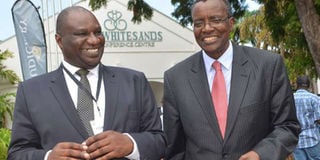Judiciary must not let down Kenyans

Chief Justice David Maraga (right) talks with Justice Otieno Odek during the Annual Judges Conference in Mombasa on July 4, 2017. Kenyans must give the Judiciary the support it needs to execute its mandate. PHOTO | KEVIN ODIT | NATION MEDIA GROUP
What you need to know:
- The Constitution is an embodiment of the basic rights necessary to ensure the enjoyment of liberty.
- The Chief Justice does not need to amend the law to prevent access to the higher court.
It was, indeed, gratifying to hear Chief Justice David Maraga assure the citizenry that the Judiciary is going to remain independent and deliver its verdicts without fear or favour in the coming elections.
That assurance, coming from the head of the Judiciary, is not only timely, but also important and appropriate.
He was echoing the words of wisdom of Chief Justice John Marshall during the debate on Virginia’s Constitution in 1830 in the United States, when he said that the Judicial Department comes home in its effects to everyman’s fireside: It passes on his property, his reputation, his life, his all.
“Is it not, to the last degree important, that [a judge] should be rendered perfectly and completely independent, with nothing to influence or control [sic] him but God and his conscience?”
AUTONOMY
Chief Justice Marshall was simply saying that judges must not be under the influence of anything or anybody when making decisions that have far reaching effects and it is that independence that Kenyans expect to see in the Maraga court.
Earlier the CJ’s office had sponsored a miscellaneous (Election) Amendment Bill 2017, which had the effect of all other petitions ending in the Court of Appeal except the presidential one.
PETITIONS
These proposals, in my very humble and honest view, were unconstitutional and the CJ must withdraw them because they can curtail access to justice.
The CJ’s concern was about the many petitions that flooded the Mutunga court from the Court of Appeal.
The problem was a creation of the Supreme Court itself.
During the last election petitions, there was a discernible tension between the Court of Appeal and the Supreme Court.
SUPREME COURT
The latter, in its earlier decision, had laid down the extent of its jurisdiction but it moved away from that during the election petitions.
It appeared then that the Supreme Court had turned itself into a High Court by adopting an hour-glass jurisdiction.
This transformation of the Supreme Court actually alarmed former Chief Justice Willy Mutunga.
JURISDICTION
In his dissenting judgment in the case of Re: The Speaker of the Senate & another – vs- Attorney General & 4 Others, (2013) eKLR, he said that the Supreme Court does not have a near-limitless and substantially elastic interpretative power that, goes beyond the minds of the framers of the Constitution.
The difference between the High Court and the Supreme Court is that the former has unlimited original jurisdiction while the latter has unlimited appellate jurisdiction.
This is all the Supreme Court is required to observe and the Chief Justice does not need to amend the law to prevent access to the higher court.
FREEDOMS
That would be violating the Constitution, which gives the Supreme Court authority to entertain appeals dealing with the interpretation of the Constitution.
It is a living document, a reflection of the values and beliefs of all Kenyans.
The Constitution is an embodiment of the basic rights necessary to ensure the enjoyment of liberty, freedom, security, and religious expression.
BIAS
The Constitution has not been, and will never be perfect because it was drafted by men and women who suffer from human frailties, biases, and predilections.
As our history demonstrates, some of our constitutions have been unfair to the poor, the clergy, marginalised communities, women, and people with disabilities. Even though our constitutions may be imperfect, we must always seek perfection to protect the principles of freedom, liberty, justice, and the rule of law.
RULE OF LAW
As we approach the elections, the baton will soon be passed to the Judiciary and specifically to the Maraga court, which must not let Kenyans down in determining matters that are within its jurisdiction.
Though Justice Maraga will never be accorded an opportunity to swear the President-elect at night as happened 10 years ago, he must still make sure that the right thing is done in accordance with the Constitution.
He must use his powers vigorously and strategically.
He has to keep major opinions to himself so that he can shape and hone his legacy befitting the CJ’s responsibility to speak for the court in big cases.
UNITY
Kenyans must give the Judiciary the support it needs to execute its mandate.
We must do so knowing that we and our children want a better tomorrow in a strong and united country.
We must always remember that judges do not ascend to the heavens at night and descend to the courts in the morning carrying Ten Commandments with express authority to prophesy and declare thus says the Lord.
Mr Mwamu is the former president of the East Africa Law Society and an Advocate of the High Court of Kenya. [email protected]




